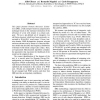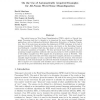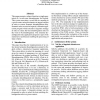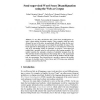2981 search results - page 28 / 597 » Word Sense and Subjectivity |
114
click to vote
EMNLP
2004
15 years 3 months ago
2004
This paper presents Domain Relevance Estimation (DRE), a fully unsupervised text categorization technique based on the statistical estimation of the relevance of a text with respe...
123
click to vote
JAIR
2008
15 years 1 months ago
2008
This article focuses on Word Sense Disambiguation (WSD), which is a Natural Language Processing task that is thought to be important for many Language Technology applications, suc...
126
click to vote
COLING
2000
15 years 3 months ago
2000
This paper presents a robust client/server implementation of a word sense disambiguator for English. This system associates a word with its meaning in a given context using dictio...
131
click to vote
BMCBI
2010
15 years 2 months ago
2010
Background: Word sense disambiguation (WSD) algorithms attempt to select the proper sense of ambiguous terms in text. Resources like the UMLS provide a reference thesaurus to be u...
123
click to vote
CICLING
2009
Springer
15 years 8 months ago
2009
Springer
Abstract. As any other classification task, Word Sense Disambiguation requires a large number of training examples. These examples, which are easily obtained for most of the tasks,...




